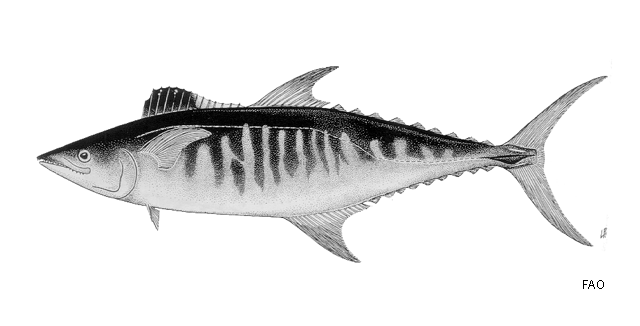| Scombridae (Mackerels, tunas, bonitos), subfamily: Scombrinae |
| 120 cm FL (male/unsexed); max.weight: 10,000.0 g |
|
pelagic-neritic; depth range - 100 m, oceanodromous |
| Western Pacific: southern Papua New Guinea and northern Australia, from Shark Bay, Western Australia to northern New South Wales. Reports of this species from Thailand and Malaysia are based on misidentifications. |
|
Dorsal spines (total): 13-15; Dorsal soft rays (total): 19-22; Anal spines: 0-0; Anal soft rays: 19-22; Vertebrae: 44-46. Interpelvic process small and bifid. Lateral line gradually curving down toward caudal peduncle. Intestine with 2 folds and 3 limbs. Swim bladder absent. Body covered with small scales. Juveniles (less than 10 cm) marked with 12-20 vertical bands which becomes less distinct or break into spots in larger fish. |
| Found more commonly around coastal headlands and rocky reefs but are also caught offshore (Ref. 6390). Juveniles (4.5 to 10 cm length) are commonly encountered during November along the beaches of Townsville, Queensland and grow to twice this size by January. They are pelagic predators, feeding exclusively on baitfish (sardines and herrings (Ref. 30572). Caught also with set lines aside from trolling with small lures or cut bait. Marketed fresh and frozen; eaten fried, broiled and baked (Ref. 9988). |
|
(Ref. 96402)
|
| reports of ciguatera poisoning |
|
Known from Sorsogon City (Ref. 58652). |
Source and more info: www.fishbase.org. For personal, classroom, and other internal use only. Not for publication.
Page created by Jen, 05.08.02,
php script by kbanasihan 06/09/2010 ,
last modified by
dsantos, 20/08/10

